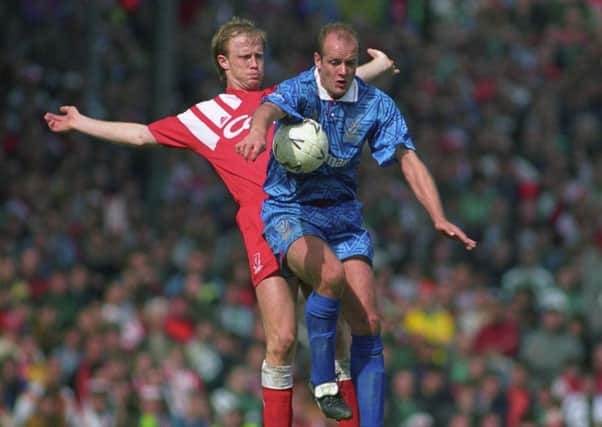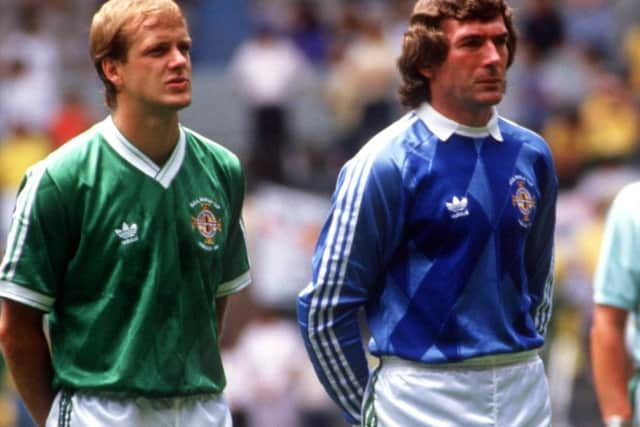No fairytale bedtime story for Clarke from Pompey replay


But for the frustrated record-breaker whose goals had helped Jim Smith’s Blues set up an FA Cup semi-final double-header against Liverpool, there was nothing he could do to ensure a memorable run had a fitting Wembley finale.
Lying in a hospital bed in Birmingham, all Colin Clarke could do was listen tentatively to the radio and pray the team-mates he reluctantly had to leave in the heat of battle could finish the job they had magnificently started against the Reds.
Advertisement
Hide AdAdvertisement
Hide AdLess than an hour beforehand, the Northern Ireland striker was leading the line for Pompey in the second of two gripping semi-final clashes against Greame Souness’ side – after the initial game finished in a 1-1 draw at Highbury.


But a freak elbow injury in the 73rd minute of the Villa Park encounter on April 13, 1992, meant he would play no part in the drama that unfolded in front of 41,869 fans in attendance and the millions glued to their TV sets at home.
It made for painful listening as the Blues eventually bowed out after extra-time and penalties, with Liverpool booking their place in the final with a 3-1 penalty shootout win.
Not that Clarke needed any more pain following the agony of Ronnie Whelan’s 87th-minute equaliser in north London eight days earlier and the measures needed to put his dislocated elbow back in place.
‘It was a tough night,’ he admitted.


Advertisement
Hide AdAdvertisement
Hide Ad‘We got so close and were all disappointed to lose on penalties.
‘It would have been nice to get to the final as Sunderland were the other finalists that year – another second division team.
‘But I don’t think we did ourselves justice on penalties, it wasn’t great.
’I would have taken a one if I’d still have been on the pitch – and scoring would have been no problem!
‘But dislocating my elbow meant it wasn’t to be.
Advertisement
Hide AdAdvertisement
Hide Ad‘I ended up in hospital, actually lying in a hospital bed listening to the end of the game and the penalties on the radio.
‘It was a strange experience and I think I’m right in saying that the only other time the doctors had seen a dislocated elbow was also from a game at Villa Park.
‘It was a very painful injury.
‘I just went up for a ball and as I landed my elbow popped out.
‘The trainer came on, it was actually Neil Sillett at the time, who’s a good friend, and he said “oh, no!”
Advertisement
Hide AdAdvertisement
Hide Ad‘I looked round and my arm and elbow was pointing in another direction.
‘The hardest part was actually getting it put back into place. That was more painful than doing it.
‘I wasn’t in hospital that long, though.
‘The boys came round in the bus and picked me up and I was able to go home with them that night.
‘We drowned our sorrows together.
‘But there was still a lot of good spirits because it was a hell of a run and we got so close.’
Advertisement
Hide AdAdvertisement
Hide AdClarke, signed from QPR for a then club record £450,00 in May 1990, played a pivotal role in that famous Cup run.
Two goals in a fifth-round replay at Middlesborough helped Pompey to a 4-2 victory at Ayresome Park and set up a home quarter-final tie against Nottingham Forest.
The Boro game still holds fond memories for the striker who scored 27 goals in 108 outings for the Blues.
But for the Fratton faithful, having Clarke leading the charge as sights were firmly set on the twin towers would have been unheard of just years earlier.
Advertisement
Hide AdAdvertisement
Hide AdBefore his move to Loftus Road, the front man was a firm favourite with Southampton fans.
He netted 36 times in 82 appearances for Saints between 1986 and 1989, including two against Pompey in a south coast derby in 1987.
His past didn’t put him off making the switch to Fratton Park, however, under Frank Burrows.
‘It’s one of those moves that doesn’t happen very often and doesn’t work out very often,’ said Clarke.
Advertisement
Hide AdAdvertisement
Hide Ad‘Being the record signing at the time, there was pressure on me to produce the goods.
‘And there was probably a little more added to that because of my Southampton links.
‘I obviously came from QPR, but I played for Southampton beforehand – and we all know what the rivalry is like between the two clubs.
‘The players were great, there was no problem.
‘You always get the one or two idiots at any club who are going to have an issue no matter what, but my skin was thick enough then to deal with it.
Advertisement
Hide AdAdvertisement
Hide Ad‘I was very aware of the rivalry and what it meant, but it never crossed my mind not to sign.
‘My time at QPR was coming to an end for different reasons and it was time to move on.
‘Portsmouth made sense for me and I made the move.
Being back on the south coast was a factor but it wasn’t a big one. I don’t think QPR had agreed a fee with anyone else at that time, so it was an easy choice.
‘For the most part it all went pretty well.’
Clarke, who made 38 appearances for Northern Ireland and notched 13 goals, scored 18 times in all competitions during his maiden season at Fratton Park as Pompey finished 17th in the old Division two.
Advertisement
Hide AdAdvertisement
Hide AdHis second season proved less prolific as he recorded seven efforts for the campaign.
But with Smith now at the helm, the striker could see the direction the club was going.
Clarke said: ‘When Jim took over things changed for the better, the club started to move in a good direction.
‘He was an experienced coach who certainly knew what the game was about.
Advertisement
Hide AdAdvertisement
Hide Ad‘It was an exciting time, with some good young players, and we had some success under Jim.
‘He started playing the youngsters, the likes of Andy Awford, Kit Symons and Darren Anderton.
‘We had a couple of good years, obviously culminating in the FA Cup semi-final.’
A concerted promotion push to the Premier League was part of those exciting times.
Advertisement
Hide AdAdvertisement
Hide AdHowever, a third-place finish in the 1992-93 season saw Pompey come up just short.
Clarke scored once in that campaign but was denied a chance to add to that when he picked up a knee injury before Christmas.
It was an injury that prematurely ended his playing days.
‘Just before the FA Cup third round that year, I got injured playing in a reserve game on a Wednesday night, I think against Brighton,’ Clarke recalled.
‘I slid into a goal post and messed my knee up pretty bad.
‘It turned out to be the end of my career.
‘We were hopeful I could return, but as it turned out the injury was more serious than we thought.
Advertisement
Hide AdAdvertisement
Hide Ad‘It was very disappointing. I was still only 29 at the time so I had a few good years left in me.
‘It’s never easy when your career comes to an end, particularly when it’s forced upon you.
‘So, yeah, it was very disappointing.’
Clarke’s last game for Pompey was a 4-1 win against Bristol Rovers on December 26, 1992.
Since then he has forged a successful career in the USA, being head coach at clubs such as Dallas FC and Puerto Rico Islanders.
Advertisement
Hide AdAdvertisement
Hide AdHe is currently in charge of Carolina RailHawks in the National American Soccer League.
But he still likes to reflect on his time at Pompey.
‘I’ve got some fond memories of my time at Pompey and made a lot of good friends who I still keep in touch with,’ he added.
‘It’s a good club. They talk about the fans as some of the most passionate fans you’ll ever play for.
‘I’m glad I played up front for them and I’m glad to see they’ve turned it around.
Advertisement
Hide AdAdvertisement
Hide Ad‘There was obviously some dark days over the past few years, but they seem to be heading in the right direction again.’
Colin Clarke on... Life in the States
I came here in 1995, actually just to visit some friends, then ended up getting offered a job.
It’s been pretty good. I’m enjoying it.
Initailly, you couldn’t find a game on TV but now it’s miles away from that. The growth’s been unbelievable and it’s nice being part of it.
...Middlesborough FA Cup replay win
The Middlesborough game was certainly a big occasion for me. It was at Ayresome Park and they were flying at the time.
Advertisement
Hide AdAdvertisement
Hide AdI think everyone expected us to go there and get beat in the replay.
Wilkinson scored a couple for them, I scored two and Darren Anderton got a couple. So it was a good performaance from everybody and a good night to get us to the quarter-finals.
...Northern Ireland going to the Euros
It’s unbelievble that Northern Ireland are going to this summer’s Euros.
Michael O’Neil has done a great job.
It wasn’t an easy job to start with – a few people had been in there and tried it.
And fair play to the federation for keeping him in a job.
Advertisement
Hide AdAdvertisement
Hide AdThey probably could have moved him on, and maybe that bit of stability and continuity helped them get to where they are today.
I was the last player to score a goal in a major championships for Northern Ireland – against Spain in Mexico 1986.
But hopefully it will all change this year. The team have got a little bit of belief in each other and I think they’ll surprise some people.